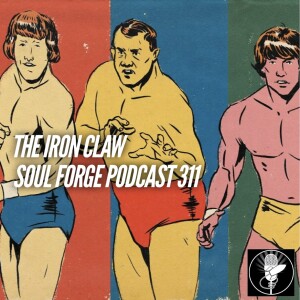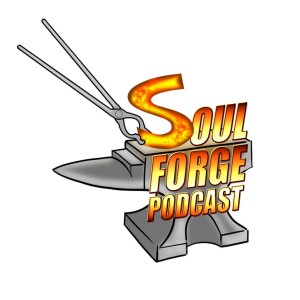
The Iron Claw tells the story of the professional wrestling family, the Von Erichs. Shawn and Leah just saw this film in theatres, and are here to share their thoughts on the movie, and recall their wrestling memories.
Of the two, Leah is a bigger fan of wrestling than Shawn. She has met many professional wrestlers. One time, Shawn saw Hulk Hogan walking up some stairs. The bulk of Shawn's wrestling knowledge is from the mid-1980s to about 1991. Leah has had much more interaction in the world of wrestling, including going on a wrestling inspired cruise.
The Iron Claw starts in the nineteen-sixties, when Fritz, a struggling wrestler, splurges on a Cadillac to foster an illusion of success, while imbuing his two young sons, Kevin and David, with a gospel of fanatical self-reliance that’s also an imperative to be the “toughest” and the “strongest.” The movie’s protagonist, and its occasional narrator, is the grownup Kevin, the family’s oldest surviving son. Kevin’s older brother, Jack, Jr., died in an accident at the age of six. Jack’s death is one of the key reversals that shadows the family, leading to the pervasive, publicity-fuelled notion—one that the Von Erichs take grimly seriously—of a family curse. The heart of the drama begins in 1979, when Kevin is making a name for himself in the ring—namely, the Sportatorium, a small Dallas arena that Fritz owns and operates. “We loved wrestling,” Kevin reminisces in voice-over, and it shows, even as the rest of the movie depicts how that love was lost, along with many of the people he loved.
“The Iron Claw” is as exuberant as it is mournful, and the high spirits of performance and achievement are inseparable from the price that they exact. Kevin is disciplined, focussed, and grounded; he’s a vigorous and enthusiastic performer, leaping from the ropes, raging, slamming, punching, and putting on a show with the maneuver—the skull-squeezing Iron Claw—that made his father famous. But for Fritz it isn’t enough that Kevin is locally successful; Fritz, who believes that he was wrongly denied the sport’s heavyweight championship, lives for the day that one of his four sons—and, indeed, preferably all of them, in succession—will win that belt.
Fritz’s pecking order is far more than merely professional. Because his very identity—as his family’s protector, the redeemer of its name and the breaker of its curse—is bound to the prospect of his sons’ successes in the ring, his professional favor is also a paternal popularity contest. At the breakfast table, Fritz unabashedly announces his ranking of his four living sons, adding that the ranking “can always change.” The young men, ranging from adulthood to adolescence, are competing, above all, for their father’s love.
This week's podcast promo: Earth Station Trek
More Episodes
 2024-09-26
2024-09-26
 36
36
 2024-09-12
2024-09-12
 36
36
 2024-09-05
2024-09-05
 42
42
 2024-08-29
2024-08-29
 74
74
 2024-08-22
2024-08-22
 34
34
 2024-08-15
2024-08-15
 40
40
 2024-08-08
2024-08-08
 39
39
 2024-08-01
2024-08-01
 53
53
 2024-07-25
2024-07-25
 37
37
 2024-07-11
2024-07-11
 42
42
 2024-07-04
2024-07-04
 48
48
 2024-06-27
2024-06-27
 65
65
 2024-06-20
2024-06-20
 55
55
 2024-06-13
2024-06-13
 51
51
 2024-06-05
2024-06-05
 83
83
 2024-05-30
2024-05-30
 97
97
 2024-05-16
2024-05-16
 57
57
 2024-05-02
2024-05-02
 61
61
 2024-04-25
2024-04-25
 47
47
Create your
podcast in
minutes
- Full-featured podcast site
- Unlimited storage and bandwidth
- Comprehensive podcast stats
- Distribute to Apple Podcasts, Spotify, and more
- Make money with your podcast
It is Free
- Privacy Policy
- Cookie Policy
- Terms of Use
- Consent Preferences
- Copyright © 2015-2024 Podbean.com






